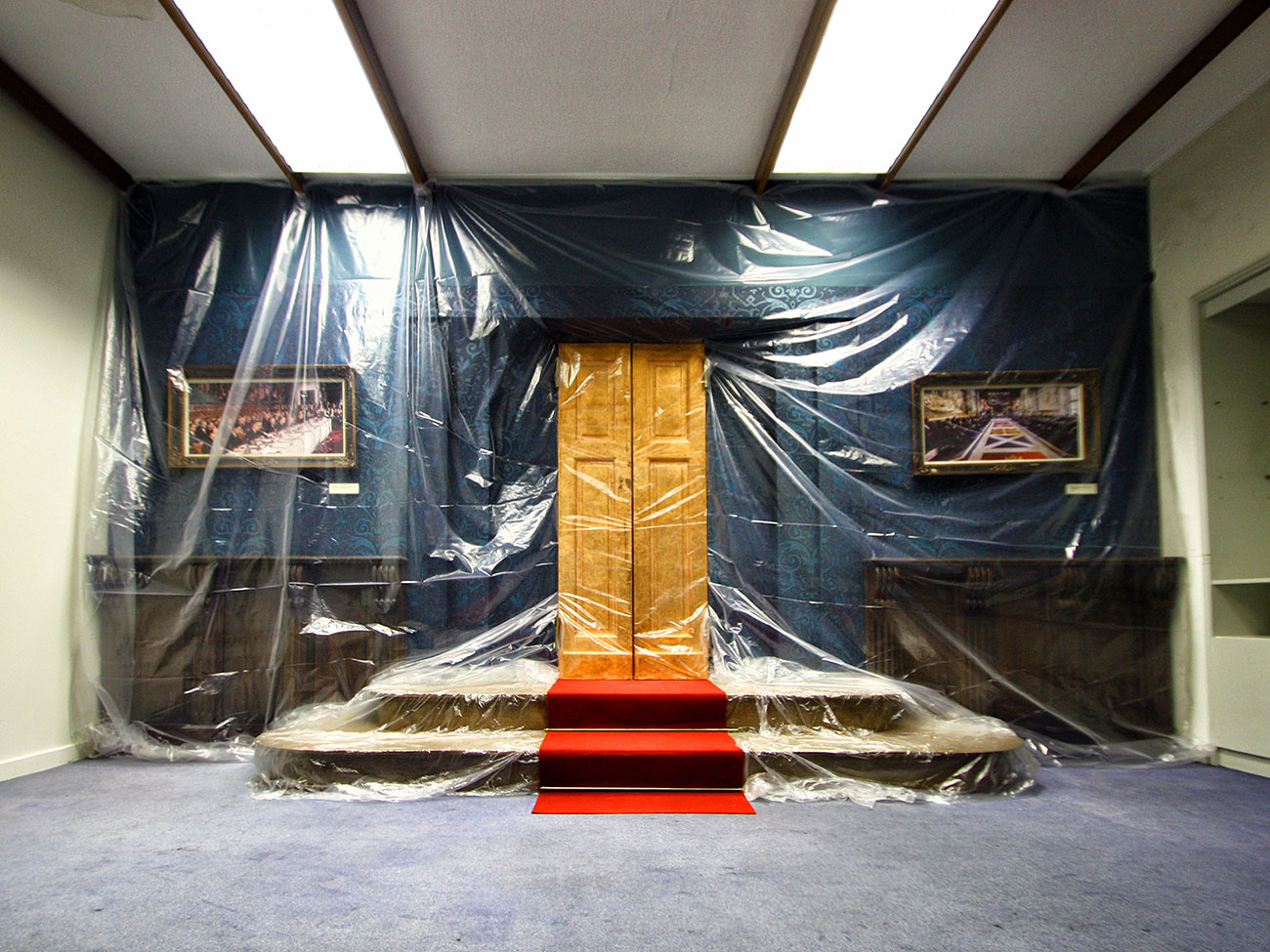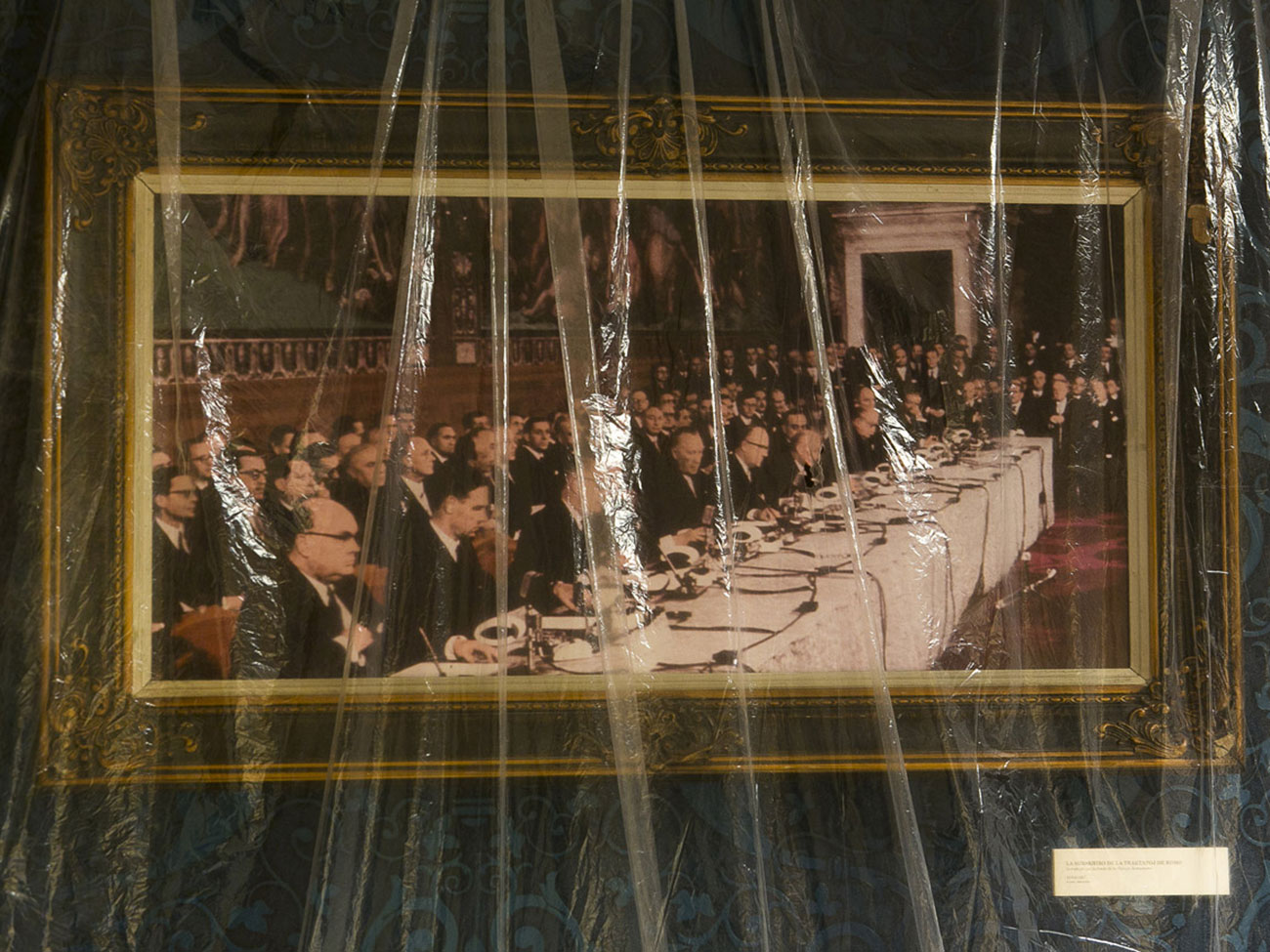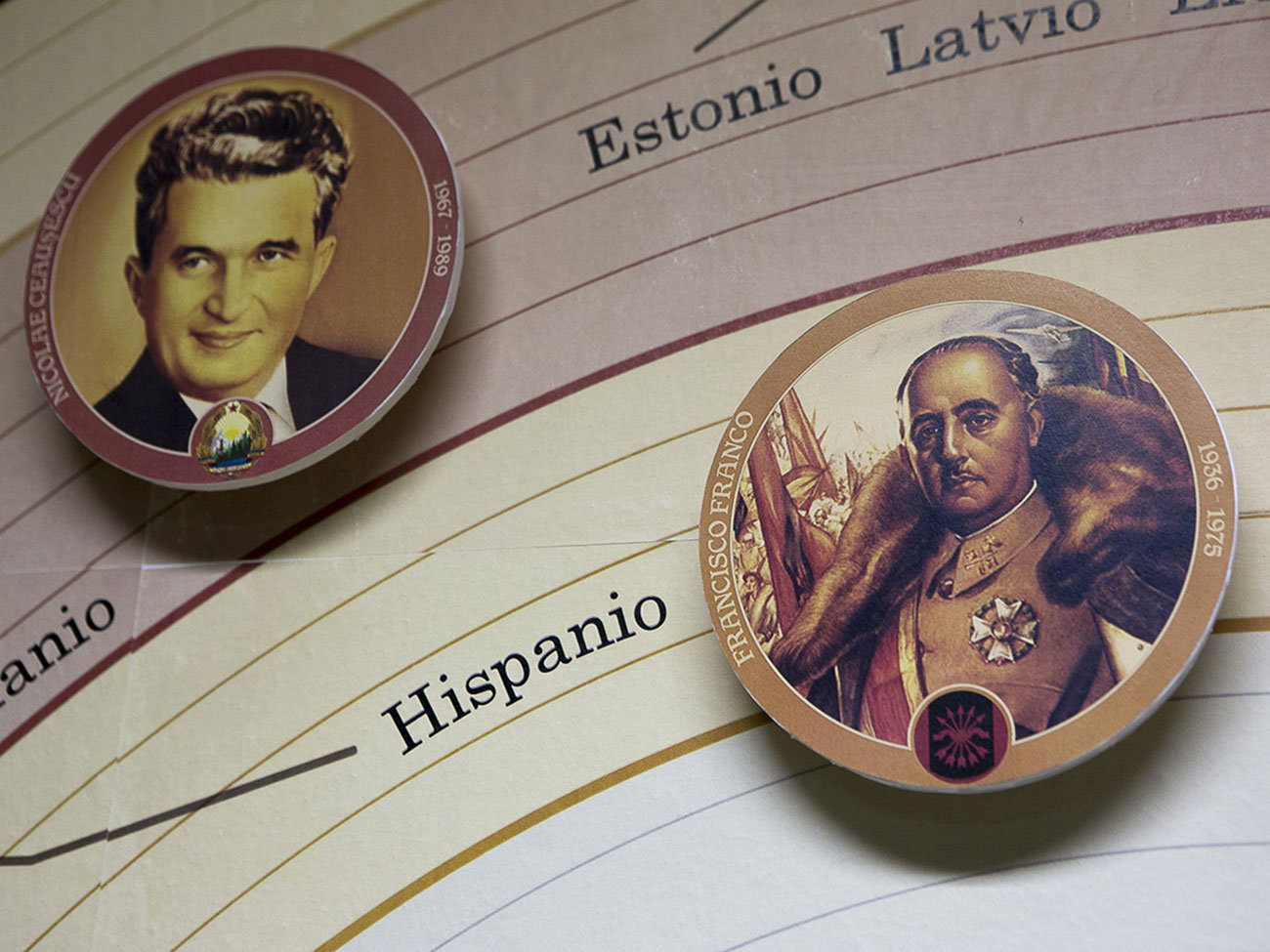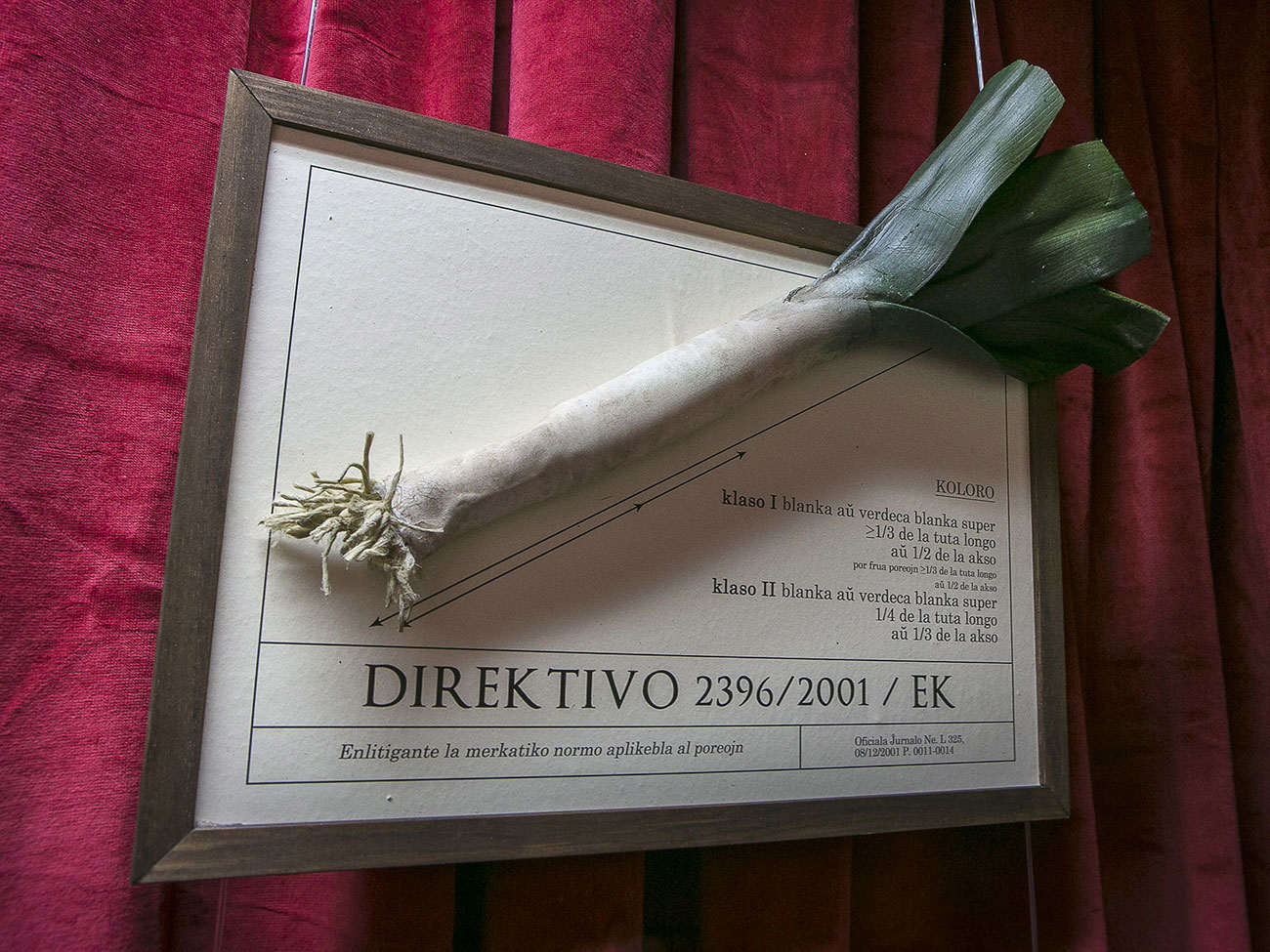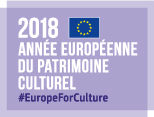Domo de Eŭropa Historio en Ekzilo
Thomas Bellinck—Festival de Marseille
Mucem, fort Saint-Jean—
Fort Saint-Jean
|
From Saturday 16 June 2018 to Sunday 30 September 2018
Last days—An immersive experience where one is alone with the objects, face to face with a future, that it is still possible to describe as “fiction”
Domo de Eŭropa Historio en Ekzilo (“The House of European History in Exile”, translated from Esperanto)
Thomas Bellinck
Performance-installation
Flash forward to an uncertain future: for some time already, the European Union has ceased to exist. A museum housed at the fort Saint-Jean takes us back in time to the beginning of the 21st century, when it had not yet imploded and where all nations still used the single European currency, the euro…
Conceived by the Belgian director Thomas Bellinck, “The House of European History in Exile” tells of the failure of the European dream, described in objects, cards and recordings that date the long disintegration of the EU. Each visitor will have an inner encounter in time and space with this journey.
An immersive experience where one is alone with the objects, face to face with a future, that it is still possible to describe as “fiction”.
- Thomas Bellinck
-
Thomas Bellinck is Belgian artist and researcher, based in Brussels. In 2013, he created there with the KVS “The House of European History in Exile”, which would go on to be presented most notably in Rotterdam, Vienna, Athens and Wiesbaden. In 2015, he co-founded also in Brussels the artist-run production society ROBIN. Since 2016, he has been a doctoral researcher in the arts at KASK/School of Arts (HoGent). His latest project is “Simple as ABC”, which deals with the western response to migration.
-
Interview with Thomas Bellinck
-
Mucem (M)
“The House of European History in Exile” asks us to consider the future from the point of view of the present. How did this idea come to you?
Thomas Bellinck (T.B.) This project was born a few years ago, when Europe was hit by a succession of crises: and I’m not referring only to the financial crisis, but also to some extent to one of identity, a cultural crisis – notwithstanding the one dubbed “the migration crisis”, which I see first and foremost as a “welcome” crisis … All of this has led me to believe that we were at a historic crossroads, even if my impression is that social and political responses weren’t up to the job. I thereby imagined a way to take a step back – similarly to how we now view the First World War – in order to observe from a distance this historic crossroads. This was how the idea came to me, of viewing the present as if it was a historic fact.
M But why choose the form of the exhibition?
T.B. Beyond the question of Europe itself, one of the founding questions of the project is: “How does the West view? ie, what are western modes of representation?” And all the more so within the context of a museum where there is a context of power! How does power self-represent? It becomes a project with the Mucem, in the Mucem; a deconstruction of the museum, in a museum!
I want that visitors have the sensation of walking around a disused museum towards a forgotten epoche – because the EU doesn’t interest anyone anymore...M The first version of project was created in 2013. How has it evolved since then?
T.B. At the time, there was still a large part of fiction in this museum. But the problem is that since then, with Brexit or the crisis in Ukraine, fact has largely caught up with fiction! Today, there’s too much fact in the exhibition. And so I need to imagine new fictions and starting points…
M Has that the project is being hosted in Marseille impacted on your new insights?
T.B. I always endeavour to work with a connection to local issues, so in Marseille for instance, I’m interested in the possibility of a future “Mediterranean Union”. Marseille is very interesting, whether one wants it or not; it’s a city where the future is being constructed. I find this totally compelling, by having my dystopian project here; how Marseille can be a point of departure for another world, for the Europe of tomorrow. Indeed, I believe that the future always seems clearer from border zones. This inspires me greatly.
Informations
Included in the full price ticket 9,50€/5€
Vente sur place au Mucem. Information and reservations : 04 84 35 13 13
For all above 14 (individual visit)
Concept & realisation : Thomas Bellinck
Dramaturgy : Sébastien Hendrickx
Technical direction : Tim Vanhentenryk
Line production : Kostas Raftopoulos
Production management : Christian Geschvinderman, Catherine Vervaecke
Construction : Azeddine Allag, Rabah Barek, Salem Bennafla, Laetitia Bonetti, Pierre Sarr Bour, Karim Bouregba, Eric Brocard, Jérôme Casy, Dimitri Chilitopulos, Mourad Choukali, Nourredine Djelloul, Marie Aurélie Fassino, Patrick Garnier, Eva Gruber, Miranda Karlsson, Jahid Kasri, Pascal Lerest, Christine Lusetti, Patrick Michault, Yuri Rabinovitz, Lola Rozé
Scenography and lighting : Stef Stessel
Set and graphics : Julie Ciavatti, Paul Gilonne, Camille Lemonnier, Anne Straetmans, Menno Vandevelde, the scenery workshops of KVS and Hessisches Staatstheater Wiesbaden, UUS Studio
Research assistance : Laura Kurtz, Marina Troupi
Translation and editing : Tawny Andersen, Ziad Chakaroun, Laurence Foulon, Francesca Pinder, Ula Sickle, Anne Vanderschueren
Bar and housekeeping : Nina Boughanim, Emmanuel Galland, Elias Kurdy, Camille Lemonnier
Original producer : KVS
Producer : new version Mucem
Coproducer : Festival de Marseille
Executive producer : ROBIN vzw
With the support of KASK / School of Arts of University College Ghent, MP2018
Many thanks to Jamila Adamou, Yasmina Amire, Garifallia Anastasopoulou, Katia Arfara, Benjamin Baelus, Lydia Bolani, Robert Beyer, Mauve Carbonell, Philippe Caroyez, André Catalão, Julie Chenot, Jean François Chougnet, Paul de Clerck, Eric De Keuleneer, Florian Deuflhard, Thanos Dokos, Jan Goossens, Paul Goossens, Achim Güssgen-Ackva, Martin Hammer, Jeroen Hardenbol, Ronny Heidenreich, Gunther Hellmann, Olivier Hoedeman, Maria Kohlert-Németh, Kostis Kornetis, Frederik Le Roy, Frie Leysen, Matthieu Lietaert, Lieve Lowet, Maria Magdalena Ludewig, Brigitte Marin, Manos Matsagganis, Stefan Mercier, Husamuddin Meyer, Stefan Moens, Muepu Muamba, Ekke Muijzers, Yiannis Papageorgiou, Giorgos Papakonstantinou, Martin Pigeon, Elisabeth Pluijmen, Tasos Sakellaropoulos, Esther Severi, Ula Sickle, Bart Staes, Yannis Stavrakakis, Marko Stamenkovic, Paul Steinhardt, Willy Thomas, Jeroen Vander Ven, Hendrik Vos, Rutger Wolfson, Angeliki Ziaki, all the staff members of Festival de Marseille, Hessisches Staatstheater Wiesbaden, International Film Festival Rotterdam, KVS, Mucem, Onassis Cultural Center, ROBIN, Wiesbaden Biennale and Wiener Festwochen
As part of MP2018 Quel Amour ! in partnership with the Festival de Marseille.
